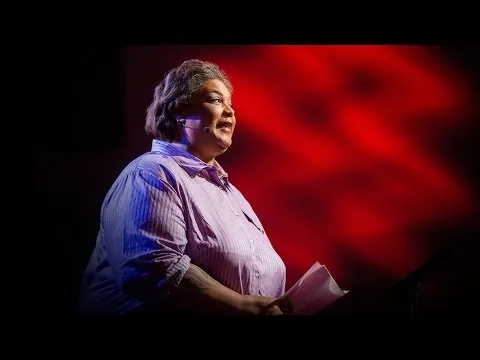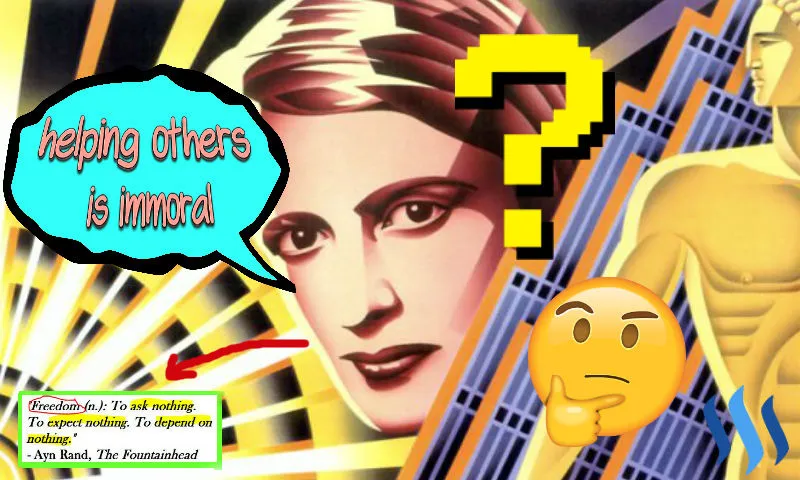
Ayn Rand is known for her controversial philosophy called objectivism. It says that real morality is not altruism but rather selfishness--to put one's own interests first above others. Ironically, until now, people fail to see its relevance even now that we live such life on social media. We may be out there browsing the internet, sharing inspirational stories or defending those bullied kids but such act show not an exact light of compassion or whatever it is supposed to be. That act of sharing those things rather become something people want others to base their opinions on about who they are.
That simple irony is enough to show the significance and timeliness of objectivism, but for you to digest it fully, let me break it down for you.

So helping others is not moral at all?
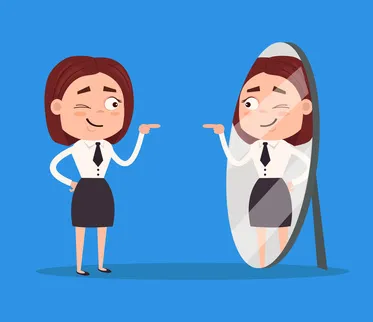
Ayn Rand indeed claimed altruism as immoral. She never liked the idea of asking others for help or extending a hand to those in need. As cruel as it may sound for most, she simply hated the idea that the privileged were as if obligated to help the poor, the weak. However, Rand justified her concept of morality through introducing objectivism as another and perhaps only way to perceive reality--that a person's only means to survive in this life where survival is obviously the reason why we eat, work, etc., thus it means that the objective reality is that since an individual's reason is what makes him or her alive, the highest prioritized or valued interest of each of us is self-interest. In this sense, Rand clarifies then that although she hates the concept of altruism, mentioning self-interest in a hierarchical position would only mean that such universally accepted morality is still there, just not the priority of the ideal moral person she had made in her mind.
Looking at Rand's philosophy without any prejudgment, what she simply meant to tell the world was that no one should suffer in his/her own life just because there is (and there really is) this seemingly moral code that tells us we should be of help to others despite being in need to fix ourselves first. You see, it happens all the time. Some often feel the need to do something for their friends so much so that they somehow have their finances and time compromised, later going through that conflict of loss in their part especially when the person offered the effort does not show gratitude the way they had expected.
It's funny because when that happens, drama might spark and the unreasonable is switched on--something Rand had always detested. Lovers, for instance have all these things going on--person 1 might ask person 2 to go with person 1 because he/she is relocating for a job, but person 2 knows he/she doesn't have a life there. Person 2 does it because he/she "loves" person 1, but sooner or later they would constantly fight because person 2 is having a hard time making her life out of the setup more favorable for person 1. Conflict basically arises.
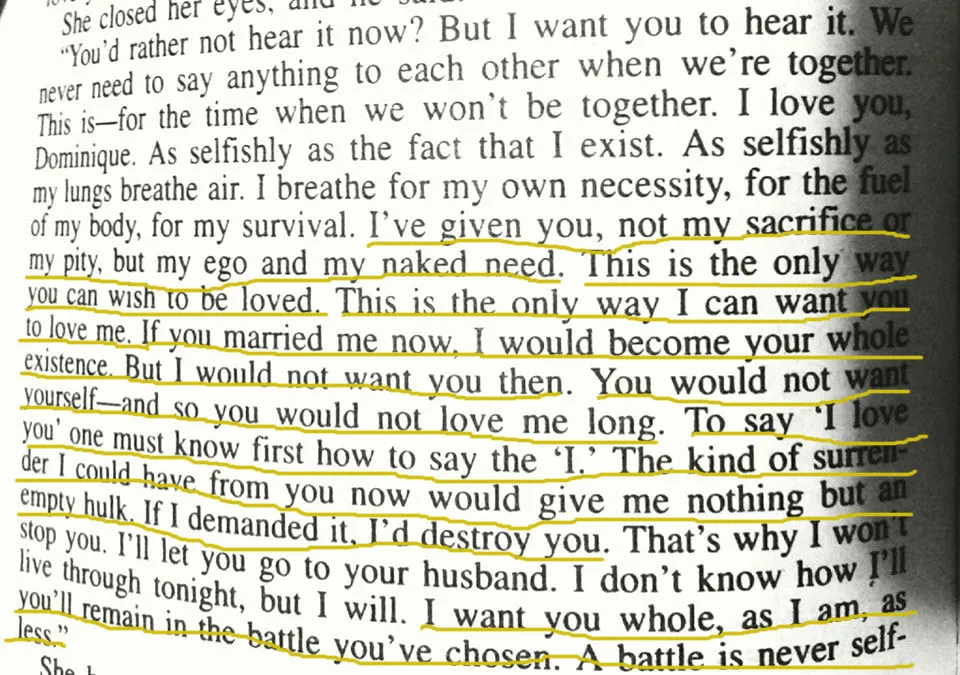
A wise thought from Rand's book The Fountainhead opens one's eyes to the reality of what this much talked about love could only offer the two people in it.
In this excerpt from the book, the hero of the story, Howard Roark responds to Dominique Francon's suggesstion that she would leave her life with her husband, her writing career, her luxurious life, and live with Howard instead in a poor place just so she could be with him. At that time, Howard could not afford to live in a place like what Dominique, a socialite, is used to. That is why Howard then says these words to let her know that such sacrifice is not love--that it wouldn't make them any happier.
A lot of couples go through a lot of unnecessary conflicts rooting from sacrifices of the individual interest. See, the reality is that we ourselves choose to bring our lives in pain out of not accepting the reality that what matters most is our own interest. We try so hard to have that "good" image by being as generous as how a saint is expected to be--then we forget about our individuality, our right to our own choice. What Rand wants us to know is that we have our own brains to think and act the way that profits us and that there is no such thing as a collective brain dictating each individual what to do.

But Ayn Rand once said she wouldn't vote a woman as president...
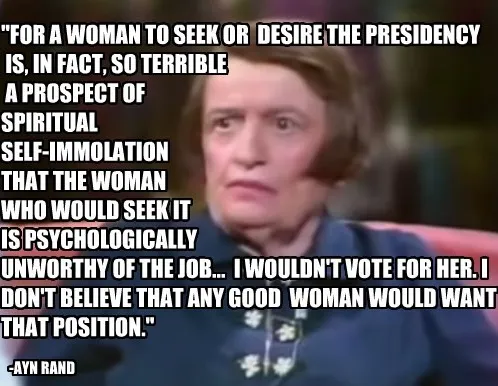
The whole statement sounds really sexist. However, as being once a part of the hypersensitive feminism, I have come to realize that there are anthropological and psychological truths about women that such movement tries to shut down. There is nothing wrong with a mother who stays at home to raise great citizens, provide them adequate nutrition, attention, and care, yet somehow the feminist movement has set trends of women conquering so many fields, seemingly degrading the importance of a housewife. It's problematic, for we know how women have this unique sense of care-giving men do not equally possess. Let's face it, men have their neurologically and biologically proven unique strength when it comes to those things they have always been known of doing. Women are more in touch with emotions on the other hand, making them perfect to raise kids at home in a manner that they do not have psychological issues that could ruin them someday.
See, Rand believes in a sexual psychology that justifies her view that a woman would not want to be in such high position. Perhaps, she might be wrong, but looking at the undeniable science facts regarding a woman being in that position, we cannot really blame her for making that statement right there. Besides, when Hilary Clinton ran for presidency, her qualification people noisily bragged about the most was that she was a woman. We could not hear actual qualifications. People these days go for "Ooh it's gonna be the first! It's gonna be record-breaking!"
All I am saying is that there are women who feel degraded for being in touch with their femininity just because movements have claimed it's being vulnerable. Watch the video below and you'll see what I mean--that women are repeatedly told these days to conquer making them feel bad about their feminine interests...
Let us be reminded that female empowerment does not mean distributing female population in all fields they are not necessarily outstanding at. There is a need for balance too. However, of course, a woman is entitled to do what she wishes as long as a whole big population is not brought to suffering in such choice like a leadership role given out of the mere "It's breaking the double standard!"

Conclusion
Ayn Rand simply offers us the harsh truth we the human race has always refused to believe or accept. We all breathe for ourselves, yet we try to breathe for others when we are obviously not capable of it. Jean-Paul Sartre might have written ideas about transcendence that inspired a lot of people to do more than what they think they are currently capable of, but not once did he say that we should defy the truth Ayn Rand had always desired for people to see--that we are bound to have limits we cannot just break dramatically as opposed to what romantic literature and media feed us.
Rand wished we could look simply at life as one's OWN LIFE--that the pursuit of happiness is not about greed per se but of embracing one's own limits, flaws, ideas, thoughts, and space.

references
- Atlas Society
- The Fountainhead by Ayn Rand
